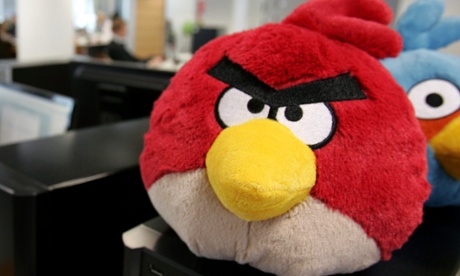
Angry Birds publisher Rovio’s revenues fell by 9% in 2014, but the key factor was declining sales of licensed merchandise and toys rather than falling income from its games.
The Finnish firm reported revenues of €158.3m (£114.3m) for 2014, down from €173.5m the previous year. Within that, the company’s income from games grew by 16.3% to €110.7m, but its consumer products revenues fell 43.4% to €41.4m.
Rovio also reported €6.2m of revenues from its media business in 2014: advertising sold within its apps, including the ToonsTV online video network.
The company’s earnings before interest and tax fell from €36.5m in 2013 to €10m in 2014, but it has not announced a net profit or loss for the latter year to compare with 2013’s €26.9m net profit.
That will be revealed in the company’s financial filing, which has not yet been published. One thing that has changed is the official figure for Rovio’s revenues in 2013: in March 2014, the company said they were €156m that year, but now they have been restated as €173.5m.
Rovio’s spokesperson told the Guardian that this is because from 2014, the company started counting app store owners’ share of sales, with 2013’s figure adjusted accordingly.
Rovio’s games have now been downloaded 2.6bn times, having added nearly 600m downloads in 2014. The company did not say how many monthly active users (MAUs) it ended the year with, however. Rovio had 263 million MAUs at the end of 2012, but this fell to 200 million by September 2014.
Rovio’s founding chief executive Mikael Hed stepped down in 2014, with his replacement Pekka Rantala predicting that the company will return to growth in 2015, buoyed by its growing stable of freemium mobile games.
“2014 results show that steps in the game portfolio, free to play competency building and advertising are going in the right direction. I am confident that with new simplified organisation and clearer vision, we will be back to the path of growth in 2015,” said Rantala as the latest results were announced.
Rovio is targeting Asia as a key market for growth this year, including developing a new game called Angry Birds Fight specifically for Japan, and signing partnerships in China and South Korea for the distribution and promotion of its games.
Rantala admitted that 2014 was “not a satisfactory year” for Rovio’s consumer products division, which at its peak had more than 200 licensing partners. However, he predicted that the Angry Birds movie in 2016 “will have a positive impact”, while promising new licensing partnerships in the coming months.
Angry Birds remains one of the most popular mobile gaming brands in the world in 2015, but Rovio is still making much less money from it than companies like Candy Crush Saga maker King and fellow Finnish firm Supercell, which makes Clash of Clans.
For example, while Rovio’s entire catalogue of games made £79.7m of revenues in 2014, Candy Crush Saga alone generated £865.2m of player spending that year. Supercell has yet to publish its 2014 financials, but they are expected to show similarly-lucrative income from its games.

